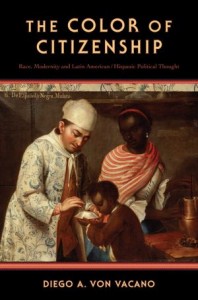Von Vacano ’93 Compares Four Thinkers’ Thoughts on Race

In his new work The Color of Citizenship (Oxford University Press), Diego Von Vacano ’93 suggests that the tradition of Latin American and Hispanic political thought which has long considered the place of mixed-race peoples throughout the Americas, is uniquely well-positioned to provide useful ways of thinking about the connections between race and citizenship. He argues that debates in the United States about multiracial identity, the possibility of a post-racial world in the aftermath of Barack Obama, and demographic changes owed to the age of mass migration will inevitably have to confront the intellectual tradition related to racial admixture that comes to us from Latin America.

Von Vacano compares the way that race is conceived across the writings of four thinkers, and across four different eras: the Spanish friar Bartolome de Las Casas writing in the context of empire; Simon Bolivar writing during the early republican period; Venezuelan sociologist Laureano Vallenilla Lanz on the role of race in nationalism; and Mexican philosopher Jose Vasconcelos writing on the aesthetic approach to racial identity during the cosmopolitan, post-national period.
Von Vacano’s study advances an alternative concept of race as inherently mixed, unstable, fluid, and politically potent. He links approaches to race in Latin American thought to canonical Western political discourse and posits “race” as a central component of modernity and of political theory.
Von Vacano is assistant professor of political science at Texas A&M University.

